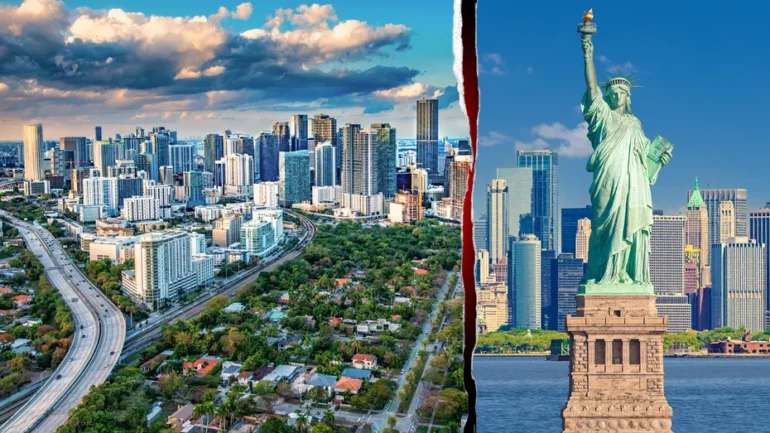On November 5, 2025, New York City voters elected Zohran Mamdani, a self-described Democratic Socialist, as their new mayor. The victory sent immediate ripples far beyond the city limits, triggering a rush of businesses and wealthy residents toward Florida. What some are calling the “Mamdani Migration” has produced record inquiries to relocation lawyers, a surge in corporate filings, and over $100 million in new real estate contracts in just a few months. Florida leaders welcome the growth, but local shop owners worry about rising rents and competition.
A Tax Shock Sparks the Exodus
Mamdani campaigned on sweeping changes: free city buses, free childcare, government-run grocery stores, a $30 minimum wage by 2030, and a freeze on rent increases. He promised to pay for it all by hiking taxes on corporations and individuals earning more than $1 million. The morning after the election, the impact was clear.
Florida business-relocation attorney Chad Cummings told WPTV his phone “has literally been ringing off the hook.” Normally quiet, his office fielded five to ten times the usual calls from New York companies. By Wednesday, he had spoken with nine firms eyeing Palm Beach County and three more targeting Port St. Lucie. “What we are seeing is really unprecedented,” Cummings said. Companies openly admitted the move was driven by fear of New York’s “oppressive regulatory and tax regime.”
State records back up the story. In the days after the vote, at least 27 New York firms filed to expand into Florida, while nine others registered full relocations. Boca Raton Mayor Scott Singer confirmed four corporate headquarters are already planning moves to his city, with “too many [others] to count” reaching out.
Real Estate Windfall in the Sunshine State
The business flight is matched by a wave of individual buyers. Miami developer Isaac Toledano, CEO of BH Group, closed more than $100 million in contracts with New Yorkers in recent months—double the volume from all of last year. “The election accelerated how people make decisions,” Toledano told Fox Business. Buyers cite uncertainty over taxes, crime, and quality of life. Many arrive flush with cash from stock markets, crypto, and online ventures.
Long-term trends amplify the surge. A Citizens Budget Commission study found 150,000 New Yorkers moved to Florida from 2018 to 2022, taking $14 billion in income. Henley & Partners’ 2025 report shows West Palm Beach (up 112% in millionaires over a decade) and Miami (up 94%) now outpace New York City (up 40%) as the world’s fastest-growing wealth hubs.
Local Businesses Feel the Squeeze
For Florida’s existing owners, the boom is a mixed blessing. Kim Grzech has run Boca Print Shop since 1995. She expects more printing jobs from newcomers but fears skyrocketing rents. “That’s always a concern,” she told WPTV. “Rent is a really big deal for a business.” In thirty years, Grzech has watched smaller shops struggle to compete as costs climb.
Real estate CEO Talbot Sutter reports a flood of New York interest in Palm Beach County and warns of price hikes ahead.
Cities Plan for Growth—and Growing Pains
Boca Raton targets mid-sized financial firms that bring high-wage jobs without overwhelming traffic. The city already has ample office space ready. In St. Lucie County, economic director Pete Tesch sees mostly indirect effects so far, but notes growing arrivals of hedge-fund managers and bankers. The county’s 16 million square feet of industrial space is largely filled by Fortune 500 giants.
Statewide, Florida’s Council of 100 has formed a committee to tackle housing affordability, traffic, and transit. President Mike Simas stresses balanced planning: “We’re focused not just on the opportunity. We’re also squarely focused on the challenges.”
Grzech hopes small businesses like hers won’t be forgotten. “I’m hoping we’ll be part of that plan—because it’s a big concern,” she said.
A Continuing Trend with New Urgency
New Yorkers have migrated south for decades, drawn by lower taxes and warmer weather. The pandemic accelerated the flow; Mamdani’s platform has supercharged it. As one South Florida developer put it, the state offers “stability, the freedom to grow,” and the simple safety of walking downtown at night without fear.
Whether the wave crests or keeps building, one thing is clear: a single election in Manhattan is reshaping economies hundreds of miles away. Florida stands ready—with open arms for some, and cautious eyes for others.
